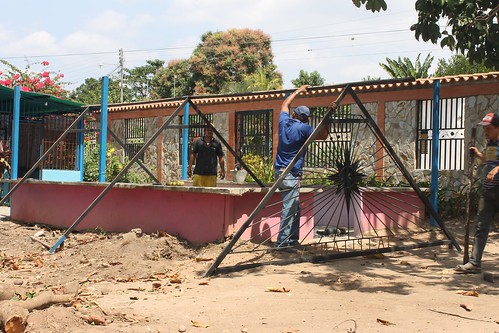On Monday, February 8, the workers arrived and began tearing down the patio to replace it with a new chapel and classroom building. We celebrated Ash Wednesday, and likewise the first Sunday of Lent, under the trees in front of our preschool, with the rubble off to one side.
The albañil, or builder, who fashioned the beautiful, inlaid-stone wall that faces the street in front of our mission, had said that he wanted to construct the new building for us. He announced that he was available for the job just as 2015 ended with enough donations in the bank for us to consider starting the project.
There will be two floors to the building. The ground floor will consist of an open-air entryway and a classroom for Luz Maria's afterschool tutoring and other educational activities. The second floor, which will overlap and provide a roof for the entry will be our chapel. We give thanks to our Lord that we have obtained most of the building materials that we will need before a new round of economic austerity measures go into effect. The Venezuelan government plans to devalue the country's currency by 37 percent and raise gasoline prices for the first time in 17 years. For a long time, the government has controlled the price of gasoline and kept it below the cost of production. It has been said, quite accurately, that in Venezuela a liter of gasoline costs less than a liter of bottled water. The objective of this policy has been to subsidize the dozens of bus lines and taxi services on which most people rely for transportation. As long as the oil-rich nation could count on vast revenues from petroleum exports, it could afford to do this. But now, as world petroleum prices plummet, this will no longer be possible. Even with a price increase of 6,000 percent, Venezuela still will have the cheapest gasoline in the world. But the change will ripple through the economy and the price of everything is sure to rise. Also, the last attempt to decontrol gasoline prices in 1989 resulted in days of street protests in Caracas and violent confrontation between protesters, police and the military.
The devaluation of currency is intended to counter triple-digit inflation, which is expected to reach 720 percent this year. Meanwhile, power outages and shortages of basic foodstuffs, medicine and medical supplies. The resulting lack of proper nutrition and medical treatment means old diseases, such as malaria, are making a comeback and new diseases, such as the zika virus, are spreading rapidly. Its adds up to a humanitarian crisis.
Our Gospel reading for February 14, the first Sunday in Lent, was Matthew 4:1-11, the evangelist's account of the temptation of Jesus by the devil in the wilderness. In the Spanish hymnal that we use, "Culto Cristiano", the Old Testament reading that complement this is Genesis 22:1-14, the story of God commanding Abraham to sacrifice his only son, Isaac. It was the Lord who sent both Abraham and Jesus into the wilderness to test them; not to trip them up, but to strengthen their faith in His Word alone. The 40 days of Lent are modeled on the 40 days that Jesus spent in the desert, facing first the physical trial of His fast, then the spiritual assault of the Devil. For us, Lent is not simply a time for giving up something we like, like chocolate, but rather putting aside all the cares of this world and getting back to the basics of Christian devotion: Repentance, prayer and meditation on God's Word.
As we attempt to do this, another element comes into play, temptation. For the more we pay attention to these things, the more Satan will strive to distract us with concerns and worries over material needs and comforts, social acceptance and the other things of this world which God will provide us, if we seek His kingdom first. Only with the help of the Holy Spirit may we remain firm in faith. And that is why there actually are 46 days until Easter Sunday. The six Sundays in Lent are not really part of our 40 days of trial, but rather days of refreshment, when we receive the gifts of His Word, and His body and blood in the Lord's Supper. Easter Sunday is the pinnacle of the church year, as the major feast of the Resurrection. But every other Sunday is a lesser celebration of the Resurrection as well. They all point to the real, final day of our resurrection. We remember Christ's suffering and death as we live through these times of uncertainty and trial, but we know the whole story, ours as well as His. Amen.



No comments:
Post a Comment